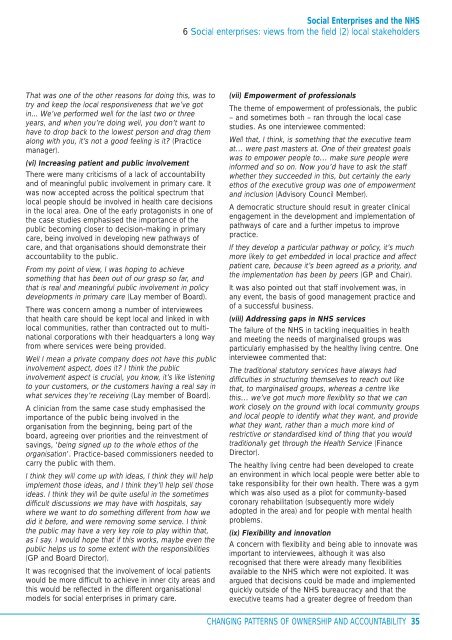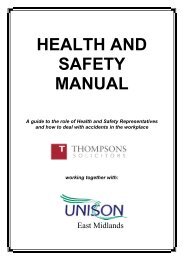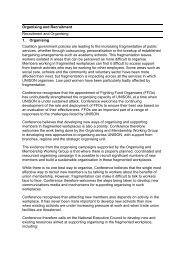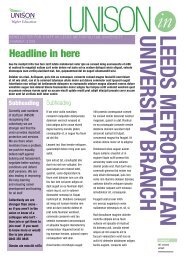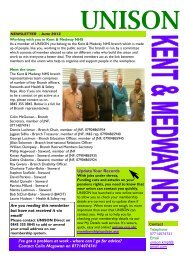Social Enterprises and the NHS - Unison
Social Enterprises and the NHS - Unison
Social Enterprises and the NHS - Unison
You also want an ePaper? Increase the reach of your titles
YUMPU automatically turns print PDFs into web optimized ePapers that Google loves.
That was one of <strong>the</strong> o<strong>the</strong>r reasons for doing this, was to<br />
try <strong>and</strong> keep <strong>the</strong> local responsiveness that we’ve got<br />
in... We’ve performed well for <strong>the</strong> last two or three<br />
years, <strong>and</strong> when you’re doing well, you don’t want to<br />
have to drop back to <strong>the</strong> lowest person <strong>and</strong> drag <strong>the</strong>m<br />
along with you, it’s not a good feeling is it? (Practice<br />
manager).<br />
(vi) Increasing patient <strong>and</strong> public involvement<br />
There were many criticisms of a lack of accountability<br />
<strong>and</strong> of meaningful public involvement in primary care. It<br />
was now accepted across <strong>the</strong> political spectrum that<br />
local people should be involved in health care decisions<br />
in <strong>the</strong> local area. One of <strong>the</strong> early protagonists in one of<br />
<strong>the</strong> case studies emphasised <strong>the</strong> importance of <strong>the</strong><br />
public becoming closer to decision-making in primary<br />
care, being involved in developing new pathways of<br />
care, <strong>and</strong> that organisations should demonstrate <strong>the</strong>ir<br />
accountability to <strong>the</strong> public.<br />
From my point of view, I was hoping to achieve<br />
something that has been out of our grasp so far, <strong>and</strong><br />
that is real <strong>and</strong> meaningful public involvement in policy<br />
developments in primary care (Lay member of Board).<br />
There was concern among a number of interviewees<br />
that health care should be kept local <strong>and</strong> linked in with<br />
local communities, ra<strong>the</strong>r than contracted out to multinational<br />
corporations with <strong>the</strong>ir headquarters a long way<br />
from where services were being provided.<br />
Well I mean a private company does not have this public<br />
involvement aspect, does it? I think <strong>the</strong> public<br />
involvement aspect is crucial, you know, it’s like listening<br />
to your customers, or <strong>the</strong> customers having a real say in<br />
what services <strong>the</strong>y’re receiving (Lay member of Board).<br />
A clinician from <strong>the</strong> same case study emphasised <strong>the</strong><br />
importance of <strong>the</strong> public being involved in <strong>the</strong><br />
organisation from <strong>the</strong> beginning, being part of <strong>the</strong><br />
board, agreeing over priorities <strong>and</strong> <strong>the</strong> reinvestment of<br />
savings, ‘being signed up to <strong>the</strong> whole ethos of <strong>the</strong><br />
organisation’. Practice-based commissioners needed to<br />
carry <strong>the</strong> public with <strong>the</strong>m.<br />
I think <strong>the</strong>y will come up with ideas, I think <strong>the</strong>y will help<br />
implement those ideas, <strong>and</strong> I think <strong>the</strong>y’ll help sell those<br />
ideas. I think <strong>the</strong>y will be quite useful in <strong>the</strong> sometimes<br />
difficult discussions we may have with hospitals, say<br />
where we want to do something different from how we<br />
did it before, <strong>and</strong> were removing some service. I think<br />
<strong>the</strong> public may have a very key role to play within that,<br />
as I say. I would hope that if this works, maybe even <strong>the</strong><br />
public helps us to some extent with <strong>the</strong> responsibilities<br />
(GP <strong>and</strong> Board Director).<br />
It was recognised that <strong>the</strong> involvement of local patients<br />
would be more difficult to achieve in inner city areas <strong>and</strong><br />
this would be reflected in <strong>the</strong> different organisational<br />
models for social enterprises in primary care.<br />
<strong>Social</strong> <strong>Enterprises</strong> <strong>and</strong> <strong>the</strong> <strong>NHS</strong><br />
6 <strong>Social</strong> enterprises: views from <strong>the</strong> field (2) local stakeholders<br />
(vii) Empowerment of professionals<br />
The <strong>the</strong>me of empowerment of professionals, <strong>the</strong> public<br />
– <strong>and</strong> sometimes both – ran through <strong>the</strong> local case<br />
studies. As one interviewee commented:<br />
Well that, I think, is something that <strong>the</strong> executive team<br />
at… were past masters at. One of <strong>the</strong>ir greatest goals<br />
was to empower people to… make sure people were<br />
informed <strong>and</strong> so on. Now you’d have to ask <strong>the</strong> staff<br />
whe<strong>the</strong>r <strong>the</strong>y succeeded in this, but certainly <strong>the</strong> early<br />
ethos of <strong>the</strong> executive group was one of empowerment<br />
<strong>and</strong> inclusion (Advisory Council Member).<br />
A democratic structure should result in greater clinical<br />
engagement in <strong>the</strong> development <strong>and</strong> implementation of<br />
pathways of care <strong>and</strong> a fur<strong>the</strong>r impetus to improve<br />
practice.<br />
If <strong>the</strong>y develop a particular pathway or policy, it’s much<br />
more likely to get embedded in local practice <strong>and</strong> affect<br />
patient care, because it’s been agreed as a priority, <strong>and</strong><br />
<strong>the</strong> implementation has been by peers (GP <strong>and</strong> Chair).<br />
It was also pointed out that staff involvement was, in<br />
any event, <strong>the</strong> basis of good management practice <strong>and</strong><br />
of a successful business.<br />
(viii) Addressing gaps in <strong>NHS</strong> services<br />
The failure of <strong>the</strong> <strong>NHS</strong> in tackling inequalities in health<br />
<strong>and</strong> meeting <strong>the</strong> needs of marginalised groups was<br />
particularly emphasised by <strong>the</strong> healthy living centre. One<br />
interviewee commented that:<br />
The traditional statutory services have always had<br />
difficulties in structuring <strong>the</strong>mselves to reach out like<br />
that, to marginalised groups, whereas a centre like<br />
this… we’ve got much more flexibility so that we can<br />
work closely on <strong>the</strong> ground with local community groups<br />
<strong>and</strong> local people to identify what <strong>the</strong>y want, <strong>and</strong> provide<br />
what <strong>the</strong>y want, ra<strong>the</strong>r than a much more kind of<br />
restrictive or st<strong>and</strong>ardised kind of thing that you would<br />
traditionally get through <strong>the</strong> Health Service (Finance<br />
Director).<br />
The healthy living centre had been developed to create<br />
an environment in which local people were better able to<br />
take responsibility for <strong>the</strong>ir own health. There was a gym<br />
which was also used as a pilot for community-based<br />
coronary rehabilitation (subsequently more widely<br />
adopted in <strong>the</strong> area) <strong>and</strong> for people with mental health<br />
problems.<br />
(ix) Flexibility <strong>and</strong> innovation<br />
A concern with flexibility <strong>and</strong> being able to innovate was<br />
important to interviewees, although it was also<br />
recognised that <strong>the</strong>re were already many flexibilities<br />
available to <strong>the</strong> <strong>NHS</strong> which were not exploited. It was<br />
argued that decisions could be made <strong>and</strong> implemented<br />
quickly outside of <strong>the</strong> <strong>NHS</strong> bureaucracy <strong>and</strong> that <strong>the</strong><br />
executive teams had a greater degree of freedom than<br />
CHANGING PATTERNS OF OWNERSHIP AND ACCOUNTABILITY 35


